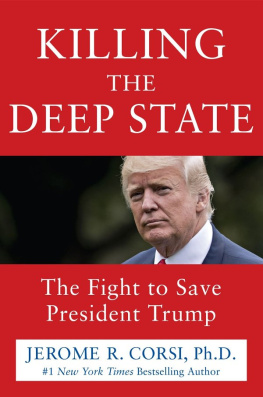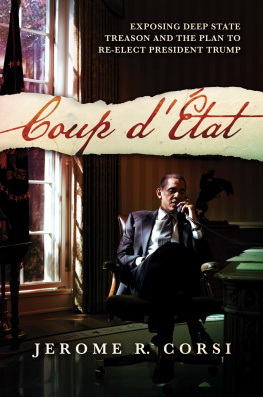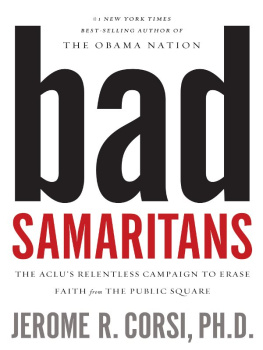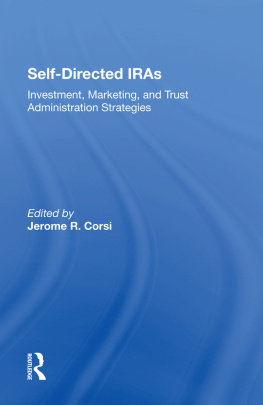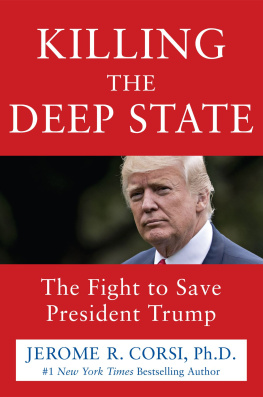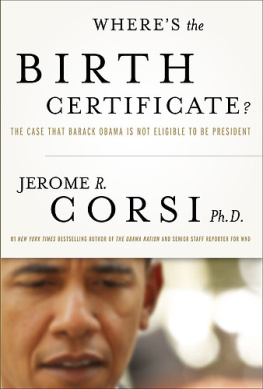Jerome R. Corsi - Why Israel Can’t Wait
Here you can read online Jerome R. Corsi - Why Israel Can’t Wait full text of the book (entire story) in english for free. Download pdf and epub, get meaning, cover and reviews about this ebook. year: 2009, publisher: Threshold eBooks, genre: Politics. Description of the work, (preface) as well as reviews are available. Best literature library LitArk.com created for fans of good reading and offers a wide selection of genres:
Romance novel
Science fiction
Adventure
Detective
Science
History
Home and family
Prose
Art
Politics
Computer
Non-fiction
Religion
Business
Children
Humor
Choose a favorite category and find really read worthwhile books. Enjoy immersion in the world of imagination, feel the emotions of the characters or learn something new for yourself, make an fascinating discovery.

- Book:Why Israel Can’t Wait
- Author:
- Publisher:Threshold eBooks
- Genre:
- Year:2009
- Rating:4 / 5
- Favourites:Add to favourites
- Your mark:
- 80
- 1
- 2
- 3
- 4
- 5
Why Israel Can’t Wait: summary, description and annotation
We offer to read an annotation, description, summary or preface (depends on what the author of the book "Why Israel Can’t Wait" wrote himself). If you haven't found the necessary information about the book — write in the comments, we will try to find it.
Why Israel Can’t Wait — read online for free the complete book (whole text) full work
Below is the text of the book, divided by pages. System saving the place of the last page read, allows you to conveniently read the book "Why Israel Can’t Wait" online for free, without having to search again every time where you left off. Put a bookmark, and you can go to the page where you finished reading at any time.
Font size:
Interval:
Bookmark:
Following the June 12, 2009, election in Iran, the world was hit by citizen-produced videos and still photographs showing millions of Iranians in the street peacefully protesting what was perceived as a fraudulent declaration by Ayatollah Khamenei that President Mahmoud Ahmadinejad had won a second term as president.
While the Iranian government moved to shut down foreign press reports documenting the postelection protest, Internet websites such as Facebook, YouTube, and especially Twitter came of age. Citizen journalists armed with cell phones, cameras, and camcorders captured images that were broadcast around the world, filling in the gap of professionally produced news. The immediacy of these obviously amateur images generated in the heat of the moment captured powerfully the emotions of millions of Iranians who dared to assemble in street protests and march under the green banners that had come to symbolize their anger. Green was the color of presidential candidate Mir-Hossein Mousavi, the former Iranian prime minister, who, protestors presumed, had won it in a landslide only to see the election stolen from him by the old line of religious clerics who control Irans governing Guardian Council.
On June 19, Irans Supreme Leader Ayatollah Ali Hoseyni Khamenei made a rare speech at the Friday prayer service at Tehran University to declare that Ahmadinejad had achieved absolute victory and to threaten that those who ignore or break the law by continued protests would face the consequences, including being held accountable for all the violence, bloodshed and rioting.for a new vote and putting all Iranian citizens on notice that the riot police and Basij would no longer hesitate to use violence to put down any and all expressions of dissent. The Basij are Irans brutal civilian vigilante force, estimated to number in the millions and best understood as a group of thugs ready to enforce the regimes dictates.
Almost immediately after Khamenei spoke, the regime sent out hundreds of fully armed riot police on motorcycles and thousands of Basij to crush the protests. The Basij entered the fray armed with batons and pipes that could be used to beat protestors and inflict massive vandalism, especially upon the student dorms at Tehran University, which the Basij promptly invaded and left in shambles.
What emerged over the next ten days were images that resembled the police riots in the civil rights and antiwar protests of the 1960s in the United States. These photos and videos had even more impact because of their impromptu nature. The beatings of protestors, the tear gas, the shootings, and the vandalism of the Basij all conveyed an emotional impact beyond any professionally generated news video, especially with the frightened or outraged comments of the photographers being heard in Farsi over the screams and shouts of the dispersed protestors, all punctuated by the crack of gunfire. The nightly citizen-generated videos sent via the Internet from Iran showed rooftop shouts in the Tehran darkness exclaiming Allahu Akbar, the same Allah is great chant that Ayatollah Khomeiniinspired revolutionaries used in 1979 to overthrow the shah.
With some 70 percent of Irans population under the age of thirty, the pent-up frustration with a repressive regime that punishes even the slightest moral digression from Islamic law threatened to boil over into revolution, not simply a demand for a fair election. The green sea of millions that took to the streets to protest Mousavis defeat threatened to become like the Ukrainian orange revolution, in which millions of people in the street were all that was needed to overthrow a totalitarian regime the people no longer cared to tolerate.
Prior to the June 12 election, Iran expert Michael Ledeen of the Foundation for Defense of Democracies claimed Mousavi was not a revolutionary but rather a leader who has been made into a revolutionary by a movement that grew up around him.
Mousavi is best known for the role he played as prime minister of Iran from 1981 to 1989 in directing Irans disastrous eight-year war against Iraq. During that war, millions of Iranians died in near-suicidal battles. Thousands of Iranian children lost their lives being sent first into battle to clear minefields in suicidal attacks with little keys around their necks to remind them they would be in heaven that day. Mousavi was Irans prime minister on October 23, 1983, when a truck driven by Hezbollah suicide bombers attacked the U.S. Marine Corps barracks in Beirut, Lebanon, killing 241 American troops. Granted, in retirement Mousavi returned to his profession as an architect, while he perfected his skills as an amateur artist and would-be poet. But the impression in the United States that Mousavi was a reformist is entirely wrong.
The real revolutionary, Ledeen claimed, is Mousavis wife, Zahra Rahnavard, and the real question is why Ayatollah Khamenei allowed her to be positioned that way in the 2009 presidential election.
Under increasing pressure to support the protestors openly, President Obama commented that the world was watching the Iranian protests, a mild statement of rebuke to Khameneis thinly veiled threat to use violence to stop street demonstrations.
The contrast was stark with President Reagan. In 1981, when the Polish government imposed martial law to suppress the Solidarity uprising that had started in Gdansk, President Reagan told a press conference, We view the current situation in Poland in the gravest of terms, particularly the increasing use of force against an unarmed population and the violations of the basic civil rights of the Polish people. Reagan is also remembered for directly challenging the former Soviet Union in his speech at the Brandenburg Gate in Berlin on June 12, 1987, when he taunted, Mr. Gorbachev, tear down this wall!
The theme that the United States would stand for freedom worldwide was articulated by President John F. Kennedy, when he said famously in his 1961 inaugural address, Let every nation know, whether it wishes us well or ill, that we shall pay any price, bear any burden, meet any hardship, support any friend, oppose any foe, in order to assure the survival and the success of liberty. The theme was continued when President George W. Bush proclaimed in his second inaugural address, When you stand for liberty, we will stand with you. President Obama himself in his historic speech in Cairo on June 4, only eight days before the contested Iranian election, included the freedom to live as you choose when he declared, These are not just American ideas; they are human rights. And that is why we will support them everywhere.
In Cairo, President Obama presented himself as the leader of the free world. Days later, challenged with the Iranian uprising in the streets, President Obama hesitated to offend the oppressive regime.
As the street violence escalated in Tehran, one video in particular became haunting. Though less than a minute long, the video was horrifying as it showed a young woman dying on the street after being shot through her heart by a bullet from an unseen police officer or Basij. Neda, whose name in Farsi means voice or calling, died with her arms outstretched above her head and her eyes fixed open, as if staring into the camera, as blood began surging from her mouth and nose, while those who came to her aid pleaded hysterically for her not to die and bystanders in shock tried in vain to revive her. Dont be afraid, dont be afraid, dont be afraid, Neda dear, dont be afraid, a white-haired man in a striped blue and white shirt is heard repeating in Farsi throughout a longer version of the video, his voice escalating in shock as he realizes Neda is quickly slipping away. The man was later identified as Nedas professor; additional videos surfaced showing Neda walking calmly with him among the protestors only moments before she was shot to death.
Font size:
Interval:
Bookmark:
Similar books «Why Israel Can’t Wait»
Look at similar books to Why Israel Can’t Wait. We have selected literature similar in name and meaning in the hope of providing readers with more options to find new, interesting, not yet read works.
Discussion, reviews of the book Why Israel Can’t Wait and just readers' own opinions. Leave your comments, write what you think about the work, its meaning or the main characters. Specify what exactly you liked and what you didn't like, and why you think so.




